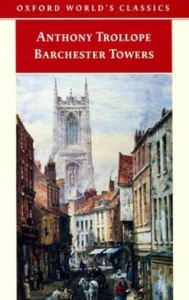BARCHESTER TOWERS | ANTHONY TROLLOPE | 1857
When you look at the date this book was written you know that it’s historical fiction but of course it was contemporary when it was first published and a big hit. This shows to me that his readers had a delicious sense of humour and still do. This is a timeless book showcasing human nature at its best and worst. Anthony Trollope said he took two years to write the 418 pages and, considering that it was more than twenty years before the typewriter was invented, all of those pages were written in longhand. What a feat!
This is the second volume of The Chronicles of Barsetshire. It follows The Warden which was about the heroine’s father the Rev. Septimus Harding and how he was hounded out of his position as warden of a hostel for poor, aged men of the parish.
First and foremost this is a great story. Yes, it’s steeped in the goings on of the Church of England cathedral town and its clergy, but this gives the narrative its underpinning. It’s really about kindness, power, avarice, gossip, spitefulness and love. The lesser sentiments we generally do not expect to find in the clergy, but the author has used the baser qualities to highlight the noble gestures and selflessness of the heroine Eleanor Bold and her close family.
The Bishop of Barchester has died and the plot revolves around the troubles that occur in his replacement’s appointment and tenure. It’s the introduction of the new bishop’s wife and chaplain that gives the story the beginnings of its lesser human qualities. Enter three suitors for the rich, pretty widow Eleanor. First up is the loathsome chaplain Rev. Obidiah Slope, think Uriah Heep as his role model but made all the worse by his hypocrisy of his religion. Next comes young Bertie, the scion of the unconventional, sneaky but likable Stanhope family, and finally the newly installed vicar of St Ewold, Rev. Francis Arabin. Who will she marry? What will happen to her suitors? Will her father regain his wardenship of the hostel? Revolving around this ménage are numbers of other characters from a lame but exquisite yet calculating and cruel young woman to the thoroughly wicked and manipulative Mrs Proudie, wife of the new bishop.
This book is not for everyone. In fact, I would go as far as to say few people these days not brought up on a steady diet of Dickens and his contemporaries would find this in the least interesting. The greater part of the story revolves around the church and the clergy but in a masterful and comic way. The good and wise characters are so endearing, and the horrible and self-serving ones are simply atrocious through their wicked plots and back-stabbing. If you can make your way through the ecclesiastical descriptions you will be rewarded with a thoroughly satisfying novel, a triumph of fun and joy.

